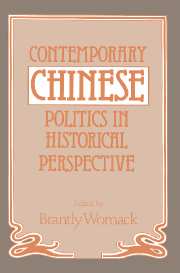Book contents
- Frontmatter
- Contents
- Contributors
- Preface
- Introduction
- PART I CONTEMPORARY CHINA AND ITS PREREVOLUTIONARY HERITAGE
- PART II POLICY DYNAMICS WITHIN THE PEOPLE'S REPUBLIC OF CHINA
- 4 The contradictions of grass-roots participation and undemocratic statism in Maoist China and their fate
- 5 The Chinese industrial state in historical perspective: from totalitarianism to corporatism
- 6 From revolutionary cadres to bureaucratic technocrats
- PART III CHINA'S EVOLVING WORLD ROLE
- PART IV TIANANMEN
- Index
6 - From revolutionary cadres to bureaucratic technocrats
Published online by Cambridge University Press: 03 May 2010
- Frontmatter
- Contents
- Contributors
- Preface
- Introduction
- PART I CONTEMPORARY CHINA AND ITS PREREVOLUTIONARY HERITAGE
- PART II POLICY DYNAMICS WITHIN THE PEOPLE'S REPUBLIC OF CHINA
- 4 The contradictions of grass-roots participation and undemocratic statism in Maoist China and their fate
- 5 The Chinese industrial state in historical perspective: from totalitarianism to corporatism
- 6 From revolutionary cadres to bureaucratic technocrats
- PART III CHINA'S EVOLVING WORLD ROLE
- PART IV TIANANMEN
- Index
Summary
Although the party-state that the Chinese Communist Party (CCP) created turned out to be the most powerful state in Chinese history and frequently has used its coercive power ruthlessly to implement social changes, the political process has never been institutionalized. That was the case during the Maoist era, as well as in the past ten years of reform, when Mao's patriarchal leadership has been publicly repudiated. The bloody June 4 incident once again demonstrates China's failure to vest political authority in offices and to develop a procedural rule for decision making. Deng Xiaoping, whose only official position was to chair the Military Affairs Commission, made the final decision to crush the students' democratic movement. Zhao Ziyang's greatest mistake during the crisis supposedly was to reveal to Gorbachev the CCP's practice of referring all important matters to Deng Xiaoping.
These two contradictory aspects of Chinese politics – the powerful party-state and the utter lack of institutionalization – lead one to view the Chinese state as a political elite rather than as institutionalized sets of offices whose incumbents are empowered to exercise the state's authority. These aspects also point to a broad hypothesis that the importance of the political elite is inversely related to the degree of institutionalization of political offices.
Mosca's and Pareto's insights that a political elite exerts enormous influence in shaping a political system were particularly true of traditional China, where a well-defined ruling elite of gentry-scholar-bureaucrats dominated not only political life but also economic and cultural life.
- Type
- Chapter
- Information
- Contemporary Chinese Politics in Historical Perspective , pp. 180 - 206Publisher: Cambridge University PressPrint publication year: 1991
- 44
- Cited by



